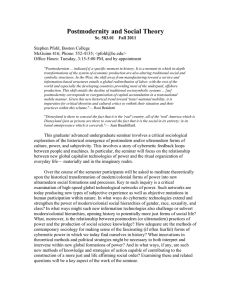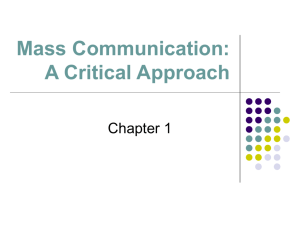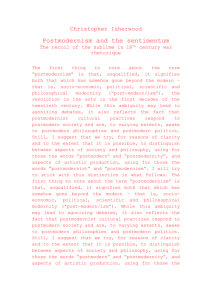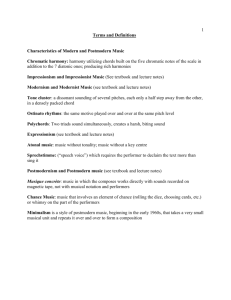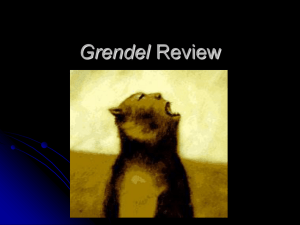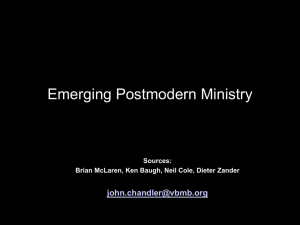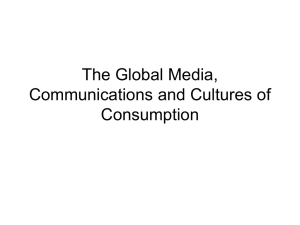Postmodernity and Social Theory
advertisement
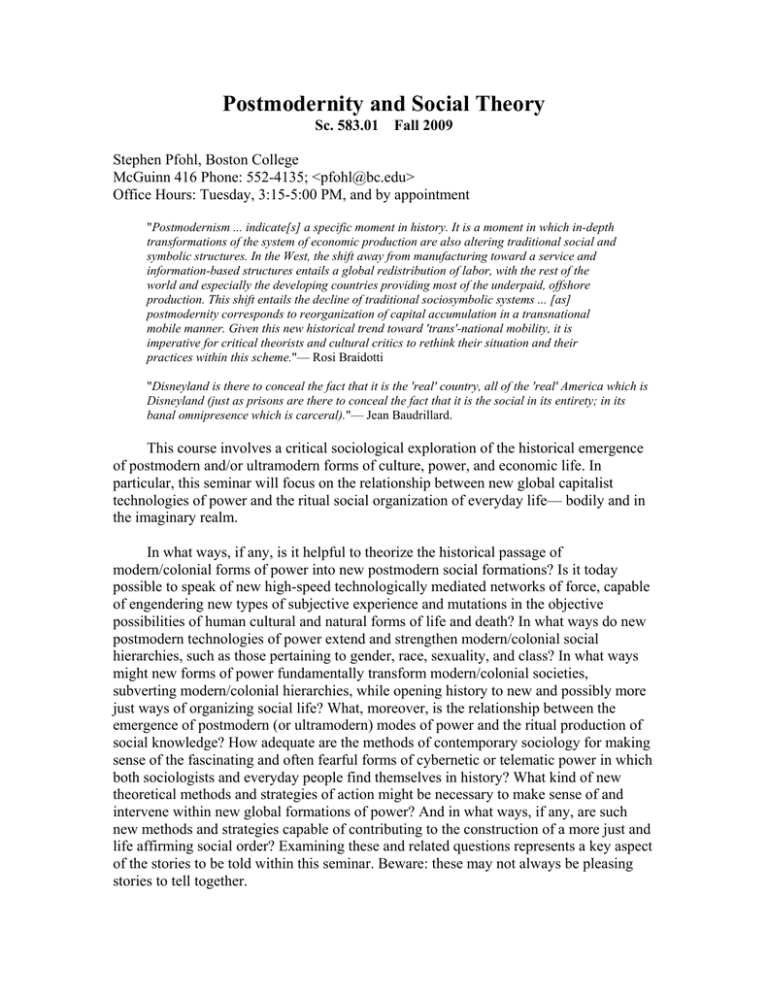
Postmodernity and Social Theory Sc. 583.01 Fall 2009 Stephen Pfohl, Boston College McGuinn 416 Phone: 552-4135; <pfohl@bc.edu> Office Hours: Tuesday, 3:15-5:00 PM, and by appointment "Postmodernism ... indicate[s] a specific moment in history. It is a moment in which in-depth transformations of the system of economic production are also altering traditional social and symbolic structures. In the West, the shift away from manufacturing toward a service and information-based structures entails a global redistribution of labor, with the rest of the world and especially the developing countries providing most of the underpaid, offshore production. This shift entails the decline of traditional sociosymbolic systems ... [as] postmodernity corresponds to reorganization of capital accumulation in a transnational mobile manner. Given this new historical trend toward 'trans'-national mobility, it is imperative for critical theorists and cultural critics to rethink their situation and their practices within this scheme."— Rosi Braidotti "Disneyland is there to conceal the fact that it is the 'real' country, all of the 'real' America which is Disneyland (just as prisons are there to conceal the fact that it is the social in its entirety; in its banal omnipresence which is carceral)."— Jean Baudrillard. This course involves a critical sociological exploration of the historical emergence of postmodern and/or ultramodern forms of culture, power, and economic life. In particular, this seminar will focus on the relationship between new global capitalist technologies of power and the ritual social organization of everyday life— bodily and in the imaginary realm. In what ways, if any, is it helpful to theorize the historical passage of modern/colonial forms of power into new postmodern social formations? Is it today possible to speak of new high-speed technologically mediated networks of force, capable of engendering new types of subjective experience and mutations in the objective possibilities of human cultural and natural forms of life and death? In what ways do new postmodern technologies of power extend and strengthen modern/colonial social hierarchies, such as those pertaining to gender, race, sexuality, and class? In what ways might new forms of power fundamentally transform modern/colonial societies, subverting modern/colonial hierarchies, while opening history to new and possibly more just ways of organizing social life? What, moreover, is the relationship between the emergence of postmodern (or ultramodern) modes of power and the ritual production of social knowledge? How adequate are the methods of contemporary sociology for making sense of the fascinating and often fearful forms of cybernetic or telematic power in which both sociologists and everyday people find themselves in history? What kind of new theoretical methods and strategies of action might be necessary to make sense of and intervene within new global formations of power? And in what ways, if any, are such new methods and strategies capable of contributing to the construction of a more just and life affirming social order? Examining these and related questions represents a key aspect of the stories to be told within this seminar. Beware: these may not always be pleasing stories to tell together. 1. (Sept. 10) Introduction: Death at the Parasite Cafe. "I am burning with desire to tell a story of the postmodern, of the society in which I find myself (k)notted in a complex network of inFORMationally mediated relations to others. This is a story to counter-memorize or countermand what I take to be an emerging terroristic formation in HIStory—the postmodern—a new American Empire of the Senseless. Although this story passes through my body breathless, it is not mine alone. Nor am I entirely by myself in the re(w)ritings that become this text. No parasite is. Repeatedly." "Come on, then." She took his hand. We'll get you a coffee and something to eat. Take you home. Its good to see you, man." She squeezed his hand. He smiled, Something cracked. Something at the core of things. The arcade froze, vibrated— She was gone. The weight of memory came down, an entire body of knowledge was driven into his head like a microsoft into a socket. Gone. He smelled burning meat." — Stephen Pfohl, Death and the Parasite Cafe and William Gibson, Neuromancer. 2. (Sept. 17) New Global Technologies of Capitalist Power. “Streamed culture [is] when capitalism has suddenly and irreversibly speeded up beyond necessary production, beyond definite consumption, achieving for the first time in financial history that long-sought state of economic … equilibrium: zero-time circulation of value in a new economy typified by the circulation of pure capital…. Here, just as Marx had prophesied in the Communist Manifesto, the unfettered movement of the commodity-form breaks beyond the strictly economic sphere to involve the market penetration of every dimension of human experience, from electronically mediated human subjectivity and processed (social) relations to the biogenetic engineering of human reproduction…. [With this] streamed capitalism announces … the global consolidation of multinational corporations into branded electronic networks, not domiciled in a fixed geographic location, but representative only of a strategic node in the circulation of digital capital.” — Arthur Kroker, The Will to Technology 1. Stephen Pfohl, “New Global technologies of Power: Cybernetic Capitalism and Social Inequality,” Chapter 23 in Mary Romero and Eric Margolis, eds., The Blackwell Companion for Social Inequalities. Cambridge, MA: Blackwell Publishers, 2006, pp. 546-592. 2. Ramón Grosfoguel and Ana Margarita Cervantes-Rodriguez, “Introduction. Unthinking Twentieth-Century Eurocentric Mythologies: Universalist Knowledges, Decolonization, and Developmentalism, in Ramón Grosfoguel and Ana Margarita Cervantes-Rodriguez, eds., The Modern/ Colonial/ Capital World-System in the Twentieth Century: Global Processes, Antisystemic Movements, and the Geopolitics of Knowledge, Westport, CT: Praeger, 2002, pp. xi- xxix. 3. Marshall Berman, “Introduction: the Modern Landscape” in The Reenchantment of the World, Ithaca, New York: Cornell University Press, 1981, pp. 15-24. supplementary reading: Arthur Kroker, The Will to Technology and the Culture of Nihilism: Heidegger, Nietzsche, and Marx, Toronto, University of Toronto Press, 2004. Jerry Mander, In the Absence of the Sacred: The Failure of Technology and the Survival of the American Indian Nations, San Francisco: Sierra Club Books, 1991. Manuel Castells, The Rise of Network Society, Vol. 1, The Information Age: Economy, Society and Culture, Cambridge, MA: Blackwell Publishers, 1996. Joanna Macy, World as Love World as Self: Courage for Global Justice and Ecological Renewal, Berkeley, CA: Parallax Press, 2007. 3. (Sept. 24) Setting the Stage in History. "In the morning I walked to the bank. I went to the automated teller to check my balance. I inserted my card, entered my secret code, tapped out my request. The figure on the screen roughly corresponded to my independent estimate, feebly arrived at after long searched through documents, tormented arithmetic. Waves of relief and gratitude flowed over me. The system had blessed my life. I felt its support and approval. The system hardware, the mainframe sitting in a locked room in some distant city. What a pleasing interaction. I sensed that something of deep personal value, but not money, not at all had been authenticated and confirmed. A deranged person was escorted from the bank by two armed guards. The system was invisible, which made it all the more impressive, all the more disquieting to deal with. But we were in accord, at least for now. The networks, the circuits, the streams, the harmonies.'—Don DeLillo, White Noise. 1. Teresa Brennan, “Introduction,” and “The Foundational Fantasy,” in Exhausting Modernity: Grounds for a New Economy, New York: Routledge, 2000, pp. 1-17; 21-40. 2. Marshall Berman, “Chapter 1: The Birth of Modern Scientific Consciousness” and Chapter 2: “Consciousness and Society in Early Modern Europe,” in The Reenchantment of the World, pp. 25-65. 3. Stephen Pfohl, "Questions of Access and Excess," in Death at the Parasite Cafe: Social Science (Fictions) and the Postmodern, New York: St. Martin's Press, 1992, pp. 11-39.** 4. Paul Gilroy, The Black Atlantic: Modernity and Double Consciousness. Cambridge, MA: Harvard University Press, 1993, pp. 1-40. 5. Michael Hardt and Antonio Negri, Multitude, New York: The Penguin Press 2004, “Preface: Life in Common,” pp. xi.-xviii; “War, 1.1 Simplicissimus,” pp. 1-35. supplementary reading: Stephen Crook, Jan Pakulski, and Malcolm Waters, Postmodernization: Change in Advanced Society. London: SAGE Publications, 1992. Mike Gane, Baudrillard: Critical and Fatal Theory, New York: Routledge, 1991. Trinh T. Minh-ha, "All-Owning Spectatorship," in When the Moon Waxes Red: Representation, Gender and Cultural Politics, New York: Routledge, 1991, pp. 81-105. Susan Willis, "Unwrapping Use Value," in A Primer for Daily Life, New York: Routledge, 1991, pp. 1-21. Rosi Braidotti, Nomadic Subjects: Embodiment and Sexual Difference in Contemporary Feminist Theory, New York: Columbia University Press, 1994, pp. 1-39. Scott Lash and John Urry, Economies of Signs and Space, Thousand Oaks, CA: SAGE Publications, 1994. Mark Poster, ed., "Introduction," in Jean Baudrillard: Selected Writings, 2nd edition, Stanford, CA: Stanford University Press, 2001, pp. 1-9. 4. (Oct. 1) Moving Subjects and Objects: Flowing Systems of Power and War. "The spectacle is capital to such a degree of accumulation that it becomes an image."—Guy Debord, Society of the Spectacle “Postmodernism...is not just another word for the description of a particular style. It is also a periodicizing concept whose function is to correlate the emergence of new formal features in culture with the emergence of a new type of social life of a new economic order—what is euphemistically called modernization, postindustrial, or consumer society, the society of the media or spectacle, or multinational capital."—Fredric Jameson, "Postmodernism and Consumer Society" 1. Michael Hardt and Antonio Negri, Multitude, “ War, 1.2 Counterinsurgencies,” pp. 36-62. 2. Elizabeth Grosz, “Intensities and Flows,” in Volatile Bodies: Toward a Corporeal Feminism, Bloomington: Indiana University Press, 1994, 160-183.* 3. Patricia Ticineto Clough, “Introduction: Thought’s Reach into the Future,” and “Television: A Sacred Machine,” in Autoaffection: Unconscious Thought in the Age of Teletechnology, Minneapolis, University of Minnesota Press, 2000, pp. 1-20; 21-27.* 4. Jean Baudrillard, "The System of Objects," in Selected Writings, Stanford, CA: Stanford University Press, 2001, pp. 13-31.* 5. Paul Gilroy, "Masters, Mistresses, Slaves and the Antinomies of Modernity," in The Black Atlantic, pp. 41-71. supplementary reading: David Harvey, The Condition of Postmodernity, London: Basil Blackwell, 1989. Jean Baudrillard, "Consumer Society," in Selected Writings, pp. 29-56. Gilles Deleuze and Félix Guattari, A Thousand Plateaus: Capitalism and Schizophrenia, trans. Brian Massumi, Minneapolis University of Minnesota Press, 1987. Zine Magubane, “Introduction” and “Could the Post in Post-Apartheid be the Post in PostColonial?, in Zine Magubane, ed., Postmodernism, Postcoloniality, and African Studies, Trenton, NJ: African World Press, 2004, pp. vii.-xv; 127-157.* 5. (Oct. 8) From Modern (Gendered) Subjects to Postmodern Cyborgs. "Our cyborg worlds extend from the military... to video games, to advertising, to home appliances, to the work-place, to 'defence' debates. In all those realms, the military information society not only defines the ruling order but also sets the terms for what counts as an effective opposition."—Les Levidow and Kevin Robins, Cyborg Worlds 1. Donna Haraway, "A Cyborg Manifesto: Science, Technology, and Socialist Feminism in the Late Twentieth Century," in Simians, Cyborgs, and Women: The Reinvention of Nature, New York: Routledge, 1991, pp. 149-181.* 2. N. Kathryn Hayles, "The Seductions of Cyberpace," in Verena Andermatt Conley, ed., Rethinking Technologies, Minneapolis: University of Minnesota Press, 1993, pp. 173-190.* 3. Jackie Orr, "Panic Diary: Reconstructing a Partial Politics and Poetics of Disease," in Gale Miller and James Holstein, eds., Reconsidering Social Constructionism. New York: Aldine de Gruyter, 1993, pp. 441-482.* 4. Marshall McLuhan, "Cybernation and Culture," in Charles R. Dechert, ed. The Social Impact of Cybernetics, New York: Simon and Schuster, 1966, pp. 95-108.* 5. Arthur Kroker, “Technological Humanism: The Processed World of Marshall McLuhan,” in Technology and the Canadian Mind, Montreal: New World Perspectives, 1986, pp. 52-86.* #Video: to be shown in the seminar: Road Stories for the Flesh-Eating Future, A film by Lewis Cohen, featuring Arthur and Marilouise Kroker, California and Electronic Post Office in Association with CBC Newsworld, 1999. supplementary reading: www.ctheory (explore this website) Chris Hables Gray, "The Cyborg Soldier: The US Military and the Postmodern Warrior," in Les Levidow and Kevin Robins, eds., Cyborg Worlds: the Military Information Society, London: Free Association Books, 1989, pp. 43-71. Rosi Braidotti, "Organs Without Bodies," in Nomadic Subjects, pp. 41-56.* Chris Hables Gray ed., with assistance of Heidi J. Figueroa-Sarriera and Steven Mentor, The Cyborg Handbook, New York: Routledge, 1995. Norbert Wiener, The Human Use of Human Beings: Cybernetics and Society, London: Free Association Books, 1989 (1950). Scott Lash and John Urry, "Reflexive Subjects," in Economies of Signs and Space, pp. 31-59. Arthur and Marilouise Kroker, “Viral Power,” Interview with William Wood, Critical Sociology, Vol. 30, No. 2 (2004), pp. 385-396. 6. (Oct. 15) Eating the Racialized Other of Modernity "The commodification of Otherness has been so successful because it is offered as a new delight, more intense, more satisfying than normal ways of doing and feeling.... The 'real fun' is to be had by bringing to the surface all those 'nasty' unconscious fantasies and longings about contact with the Other embedded in the secret (and not so secret) deep structure of white supremacy."— bell hooks 1. Paul Gilroy, "'Jewels from Bondage': Black Music and the Politics of Authenticity," in The Black Atlantic, pp. 70-110. 2. Michael Hardt and Antonio Negri, Multitude, “Resistance,” pp. 63-95. 3. bell hooks, "Introduction" and "Eating the Other," in Black Looks: Race and Representation. Boston: South End Press, 1992, pp. 1-7; 21-39.* 4. Cornel West, "Black Culture and Postmodernism," in Barbara Kruger and Phil Marini, eds., Remaking History, Seattle, WA: Bay Press, 1990, pp. 87- 96.* 5. Stephen Pfohl, "Twilight of the Parasites: Ultramodern Capital and the New World Order," Social Problems, Vol. 40, No. 2, (May 1993), pp. 129-151.* supplementary reading: Ariel Dorfman, The Empire's New Clothes, New York: Pantheon, 1983, pp. 3-64, 108-131, 199210. Edward Said, "In the Shadow of the West," Wedge 7/8 (Winter/Spring 1985), pp. 4-11. bell hooks, "Postmodern Blackness," in Yearnings, Boston: South End Press, 1990, pp. 23-31. Gloria Anzaldua, "La conciencia de la mestiza: Towards a New Consciousness," in Gloria Anzualdua, ed., Making Face, Making Soul: Creative and Critical Perspectives by Women of Color, San Francisco; Aunt Lute Foundation, 1990, pp. 377-389. Michael Ventura, "Hear that Long Snake Moan," in Shadow Dancing in the USA, Los Angeles: Jeremy P. Tarcher Inc., 1985, pp. 103-162. 7. (Oct. 22) From the Haunts of Production to the Ecstasies of Consumption. "The logic of representation—of the duplication of its object—haunts all rational discursiveness. Every critical theory is haunted by this surreptitious religion, this desire bound up with the object, this negativity subtly haunted by the very form it negates."— Jean Baudrillard. 1. Fredric Jameson, "Postmodernism and Consumer Society," in Hal Foster (ed.), The AntiAesthetic, Port Townsend, WA: Bay Press, 1985, pp. 111-125.* 2. Stephen Pfohl, "A Story of the Eye/I"" in Death at the Parasite Cafe: Social Science (Fictions) and the Postmodern, 59-103.** 3. Jean Baudrillard, "Mirror of Production," in Selected Writings, pp. 101-121. 4. Teresa Brennan, “Energetics,” in Exhausting Modernity: Grounds for a New Economy, New York: Routledge, 2000, pp. 41-54. 5. Michael Taussig, "Tactility and Distraction," in The Nervous System, New York: Routledge, 1992, pp. 141-148.* supplementary reading: Jean Baudrillard, "For a Critique of the Political Economy of the Sign," in Selected Writings, pp. 57-97. Doulas Kellner, Media Culture: Cultural Studies, Identity and Politics Between the Modern and the Postmodern, New York: Routledge, 1995. Norman K. Denzin, Images of Postmodern Society: Social Theory and Contemporary Cinema, London: SAGE, 1991. Zigmunt Bauman, Consuming Life, Malden, MA: Polity Press, 2007. 8. (Oct. 29) From Doubled Consciousness to Cybernetic Feedback. "P]ostmodernism enjoins us in the necessity for engaging in a cultural politics... It is not surprising that the most interesting theoretical works and reflections on the state of contemporary culture have come out of art and literary [engagements]... and have come from women... who have attempted to grapple with the... issue of representation of women. They do not necessarily offer positive images of women, but they do question the notion of "Woman" as a natural construct. They do not offer solutions, but instead force the readers of their works to develop skills in interpreting and reading. It is important to transit skills that will allow consumers of capitalism to understand the power of images in general and to question the notion of immutability of that which we take to be real. It is at this conjuncture that aesthetic judgment and politics meet."—Kim Sawchuk, "A Tale of Inscription/Fashion Statements." 1. Ramón Grosfoguel, “Geopolitics of Knowledge and the Coloniality of Power,” in Stephen Pfohl, Aimee Van Wagenen, Patricia Arend, Abigail Brooks, and Denise Leckenby, eds., Culture, Power and History: Studies in Critical Sociology, Leiden: Brill, 2006, pp. 479-506.* 2. Michael Hardt and Antonio Negri, Multitude, “Dangerous Classes,” pp. 103-157. 3. Alondra Nelson, “Introduction: Future Texts,” Social Text, 71 (Summer 2002), special issue on Afrofuturism, pp. 1-15.* 4. Ron Eglash, “African Influences in Cybernetics,” in Chris Hables Gray, ed., The Cyborg Handbook, New York Routledge, 1995, pp. 17-27.* 5. Teresa Brennan, “Inertia,” in Exhausting Modernity: Grounds for a New Economy, New York: Routledge, 2000, pp. 55-73. supplementary reading: Meaghan Morris, "Room 101 or a Few Worst Things in the World," in The Pirate's Fiancee, New York: Verso, 1988, pp. 187-211. Arthur Kroker, "Paul Virilio: The Postmodern Body as a War Machine," in The Possessed Individual: Technology and the French Postmodern, New York: St. Martin's 1992, pp. 20-50. Michele Richman, "Anthropology and Modernism in France: From Durkheim to the College de sociologie," in Marc Manganaro, ed., Modernist Anthropology: from Fieldwork to Text, Princeton, NJ: Princeton University Press, 1990, pp. 183- 214. Emily Martin, "Complex Systems" and "Flexible Systems" in Flexible Bodies: the Role of Immunity in American Culture from the Days of Polio to the Age of Aids. Boston: Beacon Press, 1994, pp. 115-126; 143-159. Stephen Pfohl, "The Double or No-Thing," and "Elementary Forms of Ultramodern Social Life," in Death at the Parasite Cafe: Social Science (Fictions) and the Postmodern, New York: St. Martin's Press, 1992, pp. 135-153. Scott Lash and John Urry, "Ungovernable Spaces: The Underclass and the Impacted Ghettoes," in Economies of Signs and Space, pp. 145-170. 9. (Nov. 5) Flexible Reconfigurations of Power and Catastrophe. "Who can now speak with confidence of the future of a postmodern scene when what is truly fascinating is the thrill of catastrophe, and where what drives onward economy, politics, culture, sex, and even eating is not the will to accumulation or the search for lost coherencies, but just the opposite—the ecstatic implosion of modern culture into excess, waste, and disaccumulation. When technology of quantum order produces human beings who are partmetal and part-flesh, when robo-beings constitute the growing majority of a western culture which fulfills then exceeds, Weber's grim prophecy of the coming of an age of "specialists without spirit', and when chip technology finally makes possible the fateful fusion of molecular biology and technique: then ours is genuinely a postmodern condition marked by the deepest and most pathological symptoms of nihilism."—Arthur Kroker and David Cook, The Postmodern Scene 1. Gilles Deleuze, "Postscript on the Societies of Control," October 59 (Winter 1994), pp. 3-7.** 2. Michael Hardt and Antonio Negri, Multitude, “De Corpore,” pp. 158-188. 3. Jean Baudrillard, "Symbolic Exchange and Death," in Selected Writings, pp. 122-151. 4. Tiziana Terranova, “On the Cultural Politics of Information,” Social Text, 80 (Fall 2004), pp. 51-71.* 5. Marshall Berman, “Chapter 3: The Disenchantment of the World (1)” in The Reenchantment of the World, pp. 67-113. suplementary reading: Sadie Plant, "... a single choice: suicide or revolution," in The Most Radical Gesture, pp. 75-110. Guy Debord, Society of the Spectacle, Detroit: Black and Red Press, 1983 (1967), sections 1-53. Henri Lefebvre, "The Bureaucratic Society of Controlled Consumption," pp. 68-109 in Everyday Life in the Modern World, trans. Sara Rabinovitch, London: Allen Lane, 1971. Stephen Pfohl, "Totems and Taboo" in Death at the Parasite Cafe: Social Science (Fictions) and the Postmodern, New York: St. Martin's Press, 1992, pp. 155-207. Patricia Ticineto Clough, “The Generalized Unconscious of Desiring Production,” and “True Confession,” in Autoaffection, pp. 69-107; 108-112. Paul D. Miller, AKA DJ Spooky That Subliminal Kid, Rhythm Science, Cambridge, MA: The MIT Press, 2004. with CD. William Bogard, The Simulation of Surveillance: Hypercontrol in Telematic Societies. New York: Cambridge University Press, 1996. 10. (Nov. 12) The Fate of Whose Bodies in Ultramodernity? "They see death everywhere.... They think solely of the fact that they live surrounded by vipers, tigers and cannibals. Their imaginations are constantly struck by the idea of death as figured by these images of the wild and the only way they could live in such a world...was by themselves inspiring terror."—Michael Taussig 1. Teresa Brennan, “The Time/Space Axis,” in Exhausting Modernity: Grounds for a New Economy, pp. 75-104. 2. Michael Hardt and Antonio Negri, Multitude, “Traces of Multitude,” pp. 189-227 3. Marshall Berman, “Chapter 4: The Disenchantment of the World (2)” in The Reenchantment of the World, pp. 115-132 4. Jean Baudrillard, "Simulacra and Simulations," in Selected Writings, pp. 169-187. 5. Jean Baudrillard, “The Masses: The Implosion of the Social in the Media,” in Selected Writings, pp. 210-22 supplementary reading: Sadie Plant, "Victory will be for those who create disorder without loving it," in The Most Radical Gesture, pp. 111-149 Rosi Braidotti, "Body Images and the Pornography of Representation" in Nomadic Subjects, pp. 57-74. Susan Willis, "Sweet Dreams," in A Primer for Daily Life, New York: Routledge, 1991, pp. 133157. Patricia Ticineto Clough, “Queer Desire and the Technobodies of Feminist Theory,” “Attic Women and “Grace,” in Autoaffection, pp. 113-151. Scott Lash and John Urry, "Post-Industrial Spaces," in Economies of Signs and Space, pp. 193222. 11. (Nov. 19) Reconfiguring Power and Resistance in the Postmodern. "Jean Baudrillard is the theorist of nihilism as the fate of postmodernity.... a theorist of the cynical commodity. What makes Baudrillard so dangerous, allowing him to put Nietzsche into play as the doppelganger of Marx's Capital, is that he writes from that point where the commodity-form, abandoning its historical association with the simulacra of concrete labor, reveals itself for what it always was: a transparent sign-system that traces out in the curved space of political economy (and of consumer culture) the implosive, disaccumulative, and seductive cycle of postmodern power."— Arthur Kroker, "Baudrillard's Marx." 1. Michael Hardt and Antonio Negri, Multitude, “The Long March of Democracy,” pp. 229-267 2. Teresa Brennan, “Production and Real Value,” in Exhausting Modernity: Grounds for a New Economy, pp. 105-117. 3. Marshall Berman, “Chapter 5: Prolegomena to Any Future Metaphysics,” pp. 133-152; and “Chapter 6: Eros Regained,” in The Reenchantment of the World, pp. 153-189. 4. Jean Baudrillard, "On Seduction," in Selected Writings, pp. 152-168. 5. Tricia Rose, "Voices from the Margins," and "'All Aboard the Night Train': Flow, Layering and Rupture in Postindustrial New York," in Black Noise: Rap Music and Black Culture in Contemporary America, Hanover, CT: Wesleyan University Press, 1994, pp. 1-61.* Supplementary Reading: Arthur Kroker, "Baudrillard's Marx," in Arthur Kroker and David Cook, The Postmodern Scene, New York: St. Martin's Press, 1986, pp. 170-188. Arthur Kroker, Marilouise Kroker and David Cook, "Panic USA," Social Problems, Vol. 37, No. 4 (November 1990), pp. 443-459. Stephen Pfohl, "Welcome to the Parasite Cafe: Postmodernity as a Social Problem," Social Problems, Vol. 37. No. 4 (November 1990), pp. 421-442. Jackie Orr, "Theory on the Market: Panic Incorporating," Social Problems, Vol. 37, No. 4 (November 1990), pp. 460-484. Rosi Braidotti, "Re-figuring the Subject," in Nomadic Subjects, pp. 95-110. 12. (Dec. 3) Resituating Postmodern Knowledges. "['Our' problem is how to have simulataneously an account of radical historical contingency for all claims and knowing subjects, a critical practice for recognizing our own 'semiotic technologies' for making meanings, and a no-nonsense commitment to faith accounts of a 'real' world, one that can be partiallt shared and friendly to earth-wide projects of finite freedom, adequate material abundance, modest meaning in suffereing, and limited happiness."— Donna Haraway, "Situated Knowledges." 1. Michael Hardt and Antonio Negri, Multitude, “Global Demands for Democracy,” pp. 268-327 2. Donna Haraway, "Situated Knowledges: The Science Question in Feminism and the Privilege of Partial Perspective," Simians, Cyborgs and Women, pp. 183-201. 3. Marshall Berman, “Chapter 7: Tomorrow’s Metaphysics (1), pp. 191-234; “Chapter 8: Tomorrow’s Metaphysics (2)” in The Reenchantment of the World, pp. 235-264. 4. Stephen Pfohl, “The Reality of Social Construction,” in James Holstein and Jay Gubrium, Handbook of Constructionist Research, 2008, pp. 645-668.* 5. Teresa Brennan, “Polity,” “The State and Exploitation,” in Exhausting Modernity: Grounds for a New Economy, pp. 135-155. Supplementary Reading: Paul Virilio, Open Sky; trans. Julie Rose, New York: Verso, 1997. James Clifford, "Introduction: Partial Truths," pp. 1-26 in James Clifford and George E. Marcus (eds.), Writing Culture: The Poetics and Politics of Ethnography, Berkeley; University of California Press, 1986. Mark Poster, The Mode of Information: Poststructuralism and Social Context, Chicago: University of Chicago Press, 1990. Jackie Orr, "Re/sounding Race, Re/signifying Ethnography: Sampling Oaktown Rap," in Gabriel Byrne and Mark Driscoll, eds., Prosthetic Tettitories: Politics and Hypertechnologies, Boulder, CO: Westview Press, pp. 168-203. Zygmunt Bauman, "A Sociological Theory of Postmodernity," in Intimations of Postmodernity, New York Routledge, 1992, pp. 187-204. Jackie Orr, “The Ecstasy of Miscommunication: Cyberpsychiatry and Mental Dis-ease,” in Rodney Reid and Sharon Traweek, Doing Science and Culture, New York: Routledge, 2000, 151176.* 12. (Dec. 10) Countering the Cold Passions of Ultramodern Power. "Developing a style nobody can deal with—a style that cannot be easily understood or erased, a style that has the reflexivity to create counter-dominant narratives against a mobile and shifting enemy—may be one of the most effective ways to fortify communities of resistance and simultaneously receive the right to communicate pleasure."— Tricia Rose, Black Noise. 1. Teresa Brennan, “Imaginary Time,” in Exhausting Modernity: Grounds for a New Economy, pp. 156-184; Teresa Brennan, “Exploitation and Opposition,” in Exhausting Modernity: Grounds for a New Economy, pp. 185-203. 2. Michael Hardt and Antonio Negri, Multitude, “Democracy of the Multitude,” pp. 328-358 3. Paul Gilroy, "Living Memory and the Slave Sublime," in The Black Atlantic, pp. 187-223. 4. Marshall Berman, “Chapter 9: The Politics of Consciousness” in The Reenchantment of the World, pp. 265-298. 5. Jean Baudrillard, "Fatal Strategies," in Selected Writings, pp. 185-219. Supplementary Reading: Sadie Plant, "Flee, but while fleeing, pick up a weapon," in The Most Radical Gesture, pp. 150187. Ann Game and Andrew Metcalfe, Passionate Sociology. London: SAGE, 1996, pp. 1-5; 43-86. Patricia Ticineto Clough, “The Ontological Perspective of Knowledge Objects,” in Autoaffection, pp. 152-187. Hakim Bey, T.A.Z.: The Temporary Autonomous Zone, Ontological Anarchy, Poetic Terrorism, New York: Autonomedia, 1991. Cynthia Kaufman, "Postmodernism and Praxis: Weaving Radical Theory from Threads of Desire and Discourse," Socialist Review, Vol. 24, No. 3 (1994), pp. 57-80. Course Requirements: This is an advanced reading and writing seminar. Participants taking the course for credit will be asked to read and actively discuss assigned course materials, serve as periodic leaders of seminar discussion, and to complete the following assignments. (10% of course grade) Auditors are welcome. (1) Each participant is to produce two short 4-5 double-spaced page essays addressing issues raised by particular sets of assigned readings and seminar themes. First essay is due no later than October 22. (Each essay is 15% of course grade.) The second must be submitted no later than December 10th (2) Each participant is to produce one approximately 20 double-spaced page term paper involving a theoretical investigation of a particular scene or event within postmodern society. Papers must engage explicitly with materials assigned for this particular seminar. Short (1-2 page) paper proposals are due in class on October 8. A working draft of this text is to be presented as part of the collective work of the seminar. (Term paper is 60% of course grade.) Due: Friday, December 18th, 5 PM.
